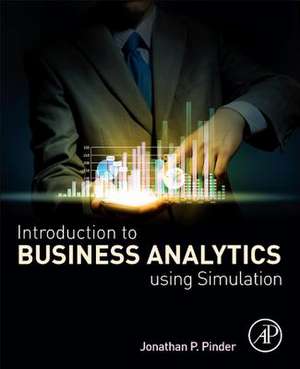Introduction to Business Analytics Using Simulation
Autor Jonathan P. Pinderen Limba Engleză Paperback – 30 aug 2016
Teaches how managers use business analytics to formulate and solve business problems and to support managerial decision makingExplains the processes needed to develop, report, and analyze business dataDescribes how to use and apply business analytics softwareIncludes 50 caselettes, quizzes for each exercise set, a quiz generator spreadsheet, and a sample syllabus.
| Toate formatele și edițiile | Preț | Express |
|---|---|---|
| Paperback (2) | 516.80 lei 22-36 zile | +40.72 lei 5-11 zile |
| ELSEVIER SCIENCE – 12 iul 2022 | 516.80 lei 22-36 zile | +40.72 lei 5-11 zile |
| ELSEVIER SCIENCE – 30 aug 2016 | 601.79 lei 43-57 zile |
Preț: 601.79 lei
Preț vechi: 781.55 lei
-23% Nou
115.19€ • 125.16$ • 96.82£
Carte tipărită la comandă
Livrare economică 21 aprilie-05 mai
Specificații
ISBN-10: 0128104848
Pagini: 448
Dimensiuni: 191 x 235 x 23 mm
Greutate: 0.91 kg
Editura: ELSEVIER SCIENCE
Public țintă
Upper-division undergraduates and graduate students worldwide working on business decision-making. Prerequisite: statistics.Cuprins
1. Business analytics is making decisions 2. Decision-making and simulation 3. Decision Trees 4. Probability: measuring uncertainty 5. Subjective Probability Distributions 6. Empirical probability distributions 7. Theoretical probability distributions 8. Simulation accuracy: central limit theorem and sampling 9. Simulation fit and significance: chi-square and ANOVA 10. Regression 11. Forecasting
Recenzii
"Business analytics are and will remain essential in every industry sector. To understand basic concepts and solve complex problems are skills necessary for any economist and engineer, among others. Introduction to Business Analytics using Simulation is the perfect textbook for learning these skills."--Fausto Pedro Garcia Marquez, Universidad de Castilla-La Mancha
Descriere
"Introduction to Business Analytics using Simulation" employs an innovative strategy to teach business analytics. It uses simulation modeling and analysis as mechanisms to introduce and link predictive and prescriptive modeling. Because managers do not know what will happen in the future but must make decisions, it treats uncertainty as an essential element in decision-making. Its use of simulation gives readers a superior way of analyzing past data, understanding an uncertain future, and optimizing results to select the best decision. With its focus on the uncertainty and variability of business, "Introduction to Business Analytics Using Simulation "provides a better foundation for business analytics than standard introductory business analytics books. Students gain a better understanding of fundamental statistical concepts that are essential to marketing research, Six-Sigma, financial analysis, and business analytics.
Teaches how managers use business analytics to formulate and solve business problems and to support managerial decision makingExplains the processes needed to develop, report, and analyze business dataDescribes how to use and apply business analytics softwareIncludes 50 caselettes, quizzes for each exercise set, a quiz generator spreadsheet, and a sample syllabus.
















